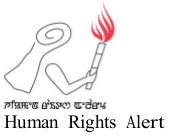Consultation on Justice for Victims of Mass Atrocities
Imphal 5-6 May 2018
We, the undersigned human rights defenders, having met for two days in Imphal, Manipur have reached the following conclusions:
1. We express our unequivocal support to, and solidarity with, the efforts of Manipur civil society, in particular, the Extrajudicial Executions Victims Families Association of Manipur (EEVFAM) and Human Rights Alert (HRA), in their efforts to combat the endemic climate of impunity.
2. We recognise the indomitable spirit of all the members of EEVFAM, appreciating in particular, the extraordinary courage of its women members, who, despite numerous ongoing challenges throughout this process and in their daily lives, are resolute in their efforts to seek justice for their loved ones.
3. We express our disappointment with the tardiness of the Central Bureau of Investigation (CBI) in filing First Information Reports (FIRs), completing investigations, and filing charge-sheets identified by the Supreme Court.
4. We are further perturbed by attempts of the CBI to obfuscate issues through its failure to name specific perpetrators, even though there is credible evidence in the complaints filed by the families of the victims.
5. We remind the CBI that their allegiance is solely to the Constitution of India and its work must be based on, and informed by, the relevant national laws and international human rights conventions that India has signed and ratified. The apparent reluctance to put on record the details of law enforcement and armed forces personnel who might be implicated in these cases is a dereliction of the CBI’s mandate, and demonstrates its failure to uphold the highest professional standards in cases before the Supreme Court.
6. We draw the attention of the CBI to the universally accepted Minnesota Protocol, which holds that investigations must be effective, thorough, impartial, independent, and transparent, and highlights that all investigative processes must be open to the scrutiny of the general public and of victims’ families. It further states that interviewees, interviewers, victims’ families, and other witnesses must be protected. We urge the CBI to uphold these standards.
7. We understand that addressing impunity requires a multifaceted approach of inquiry to trace the implications of the instrumentalities of the State, when taking on their own populations for violent reprisal.
8. We will evaluate, through an analysis of the case law and its appraisal by the victim’s communities, human rights defenders and experts, the impact of the doctrine in establishing standards to determine the existence or absence of the State’s intent behind mass atrocities of the kind recorded in Gujarat, Jammu and Kashmir, the States of North East India, Punjab, Chhattisgarh, and, in the 1970s, in West Bengal, all of which continue to this day.
9. We ascertain the State must uphold principles of liability, including the command responsibility principle, develop a regime of accountability, end impunity, and pay reparations on that basis.
10. We recognise that those who have come forward to testify against the excesses by the perpetrators, and individuals and organisations that have accompanied the victims in this process, are coming under threats from state actors. There are documented cases of reprisals in the form of threats, intimidations and harassment faced by victims and others involved in the cases. Governments, courts and the National Human Rights Commission should ensure that the victims, witnesses and defenders, including their families, engaged in the cases are not threatened, harassed or intimidated.
11. We remind the State and Central Governments of their obligations under the Constitution of India and international human rights and humanitarian law. We also remind the Government of its adoption of the United Nations Sustainable Development Goals (SDGs), their emphasis on accountability for the achievement of the Goals, and the clear obligation under Goal 16 to provide access to justice for all. We emphasise the underlying principle of Agenda 2030 that peace, human rights and effective governance are essential for the achievement of the SDGs.
12. We urge all concerned – the Supreme Court, the CBI, the Central Government, and the Government of Manipur – to take all necessary actions to alleviate the pain of victims of human rights violations and secure justice for them at the earliest.
***
Signed:
Mathew Jacob, People’s Watch
Ravi Nair, South Asia Human Rights Documentation Centre
Sharib Ali, Quill Foundation
Kirity Roy, Banglar Manab Adhikar Suraksha Mancha (MASUM)
Khurram Parvez, Asian Federation Against Involuntary Disappearances (AFAD)
Satnam Singh Bains, Punjab Documentation and Advocacy Project (PDAP)
Babloo Loitongbam, Human Rights Alert (HRA)
Edina Yaikhom, Extra-judicial Execution Victim Families Association Manipur (EEVFAM)
***
For further information please contact: 9862008838



